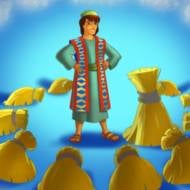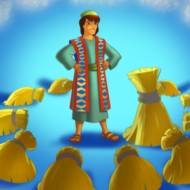
Not known to many is the fact that the story of Joseph makes an appearance at the start of Passover. Here’s why.
By Rabbi Ari Enkin, Rabbinic Director, United with Israel
The most mysterious “station” in the order of the Passover Seder is certainly the third station. It is known as “karpas” and it is the point in the seder where we dip a vegetable into salt water. Sounds simple.
However, most people don’t even know what the word “Karpas” really means or how it is translated. So too, most people don’t even know the full reason why we dip a vegetable into salt water. Sure, there is the common answer that dipping a vegetable into salt water is meant to recall the tears of slavery. That’s true, but there’s much, much more.
Let’s begin with what the word “karpas” means. It’s a Greek word meaning “vegetable.” The reason Karpas is eatenis in order to recall the ancient Roman eating practice of beginning a meal with an appetizer dipped in some kind of sauce. Indeed, the entire Seder evening is meant to recall the Roman dining experience (i.e. eating while leaning, etc.).
Karpas has also been the word used for “celery” and “parsley” in rabbinic literature. But going well beyond the surface, the karpas ritual is actually meant to invoke a lesser-known Passover personality: Joseph. That’s right. Not Moses, but Joseph makes an appearance at the Passover Seder. What’s the connection?
Just a few short weeks ago we read the Book of Esther as part of the Purim experience. Describing the scene of King Achashverosh’s party, the verse says: “There were hangings of white fine linen (“karpas”). The commentators use the same word “karpas” to describe the “technicolor dream coat,” the coat of many colors, that Jacob gave to Joseph. This act made Joseph’s brothers extremely jealous of him, leading them to consider killing him before they changed their mind and sold him as a slave to Egypt.
As such, “karpas” at the seder is meant to recall Joseph and his fine linen coat. In fact, some have the custom to dip the Karpas vegetable into the “Charoset”, a mixture intended to recall the blood of Egypt due to its red wine content, and into salt water as most of us do. This is in order to recall that Joseph’s brothers dipped Joseph’s coat into blood after they almost killed him.
What does this have to do with Passover? The Talmud teaches that “One should never favor one child over the other children in a family. It was because of a garment worth two coins that Jacob gave to Joseph…that caused the jealousy which led to the enslavement of our forefathers in Egypt.”
The story of Joseph makes an appearance at the start of Passover, the first holiday of the Jewish calendar, to remind us of the pitfalls of showing favoritism to one child over the others. Passover is the holiday of family, gathering, discussion, questions, and together. Just like favoritism was the cause of our first exile, unity and equality among all will be the cause of our redemption!
Send Passover Food Packages to Needy Israeli Soldiers
We are honored to thank the young men and women of the IDF who risk their lives to protect the citizens of Israel. Join us in sending Passover food packages (and personal notes) to needy Israeli soldiers and their families.
Bring Passover joy and blessing to the heroes of Israel who defend our freedom every day!
Many soldiers spend the Passover holiday with needy families back home. The soldiers greatly appreciate your love and concern.
CLICK HERE TO SEND YOUR PACKAGE AND NOTE TO ISRAELI SOLDIERS!
Source: United with Israel

